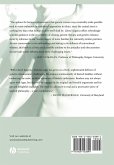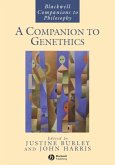Public debate about the use of genetic technology is dominated by fears of a Huxleyan 'Brave New World' or a return to the fascist eugenics of the past. In this controversial book, philosopher Nicholas Agar defuses these anxieties and defends the idea that parents should be allowed to enhance their children's genetic characteristics. Agar describes three technologies that may soon make liberal eugenics a practical possibility - cloning by somatic cell nuclear transfer, genomics, and genetic engineering - and argues that parents can use these technologies to realize their procreative goals without harming the people they will bring into existence. He rejects the idea that eugenics need divide society into genetic haves and have-nots, and denies that social pressures need force eugenic choices to converge on a single view of human excellence, suggesting that these threats to liberal social arrangements can be resisted.
Hinweis: Dieser Artikel kann nur an eine deutsche Lieferadresse ausgeliefert werden.
Hinweis: Dieser Artikel kann nur an eine deutsche Lieferadresse ausgeliefert werden.
"The options for human enhancement that genetic science mayeventually make possible tend to resist evaluation by traditionalapproaches to ethics, since the central issue is nothing less thanwhat human nature itself shall be. Liberal Eugenics offersrefreshingly sensible guidance to the possibilities of cloning,genetic therapy, and genetic enhancement by reference to our'moral images' of more familiar but relevantly similarpractices. At once conservative in its methodology and daring inits defiance of conventional wisdom, this book is a lively andaccessible antidote to the prejudice and obscurantism that pervadepublic debates about these challenging issues." JeffMcMahan, Professor of Philosophy,RutgersUniversity
"With Liberal Eugenics, Nicholas Agar has given usa lively, sophisticated defense of genetic enhancement, challengingthe anxious sentimentality of biotech luddites without embracingthe naïve, reckless optimism of bio-tech enthusiasts. Readersmay not always agree with Agar, but they will be engaged by hisoriginal and forceful arguments and his apt and delightfulexamples. The book is a pleasure to read and a provocative piece ofapplied philosophy - a rare combination." DavidWasserman, University of Maryland
"A very persuasive case for an informed, liberal though notlaissez-faire approach to research." The Guardian
"This [is a] clear, scientifically well informed andphilosophically sophisticated study." Notre Dame PhilosophicalReview
"With Liberal Eugenics, Nicholas Agar has given usa lively, sophisticated defense of genetic enhancement, challengingthe anxious sentimentality of biotech luddites without embracingthe naïve, reckless optimism of bio-tech enthusiasts. Readersmay not always agree with Agar, but they will be engaged by hisoriginal and forceful arguments and his apt and delightfulexamples. The book is a pleasure to read and a provocative piece ofapplied philosophy - a rare combination." DavidWasserman, University of Maryland
"A very persuasive case for an informed, liberal though notlaissez-faire approach to research." The Guardian
"This [is a] clear, scientifically well informed andphilosophically sophisticated study." Notre Dame PhilosophicalReview








